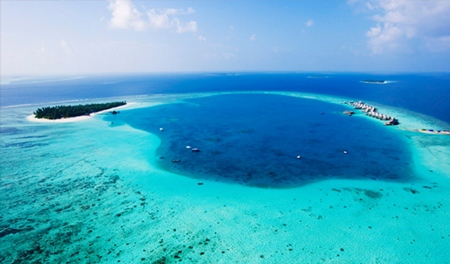Jones Lang LaSalle’s Hotels & Hospitality Group has brokered the sale of Angsana Velavaru resort to a Singapore-based REIT, marking the first deal of its kind in the island nation.
Acting on behalf of Banyan Tree Holdings, Jones Lang LaSalle’s Hotels & Hospitality Group successfully sold Angsana Velavaru for a purchase price of US$ 71 million to CDL Hospitality Trusts. The deal was also completed with the benefit of a lease agreement back to Banyan Tree Holdings and the resort will continue to be operated by Banyan Tree as the Angsana Velavaru.
 A bird’s eye view shows the South Nilandhe Atoll and the Angsana Velavaru resort.
A bird’s eye view shows the South Nilandhe Atoll and the Angsana Velavaru resort.
Set on its own private island a scenic 40-minute seaplane journey away from Male International Airport, Angsana Velavaru is located in South Nilandhe Atoll, one of the more intimate lagoons in the Maldives. Comprising 79 beachfront villas and 34 ocean villas, the resort offers a unique sense of luxury supported by a wide range of amenities, activities and facilities.
Nihat Ercan, Senior Vice President Investment Sales Asia, Jones Lang LaSalle, Hotels & Hospitality Group said: “We are delighted to announce this landmark sale and leaseback transaction, representing another first for the Maldives market following our sale of Soneva Gili Resort and Spa in 2012, the Maldives’ first ever open market transaction. The sale of a second operating resort in under 12 months underpins the growing breadth of investor demand and appeal that exists for well-established assets with strong existing cash flow in the Maldives.”
The Maldives is one of the highest RevPAR (Revenue Per Available Room) markets in the world and has enjoyed phenomenal popularity and growth over the last decade. Regarded as a top tourism destination, investor confidence in the Maldives is arguably the region’s most robust. Investor demand will continue to be driven by the country’s exceptional natural beauty; diversity of tourism demand from Europe, the Middle East and Asia which is underpinned by significant and growing demand from China; ease of accessibility with ever-increasing flight capacity; and limited future hotel supply.




